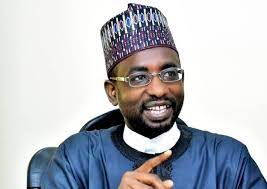The Federal Government has unveiled plans to introduce mobile phone data policy as part of its sustained initiatives to fast-track the growth of the nation’s digital economy.
The Acting Director, E-Government Development and Regulations of National Information Technology Development Agency (NITDA), Mr. Ben Ewa, gave this hint on Thursday during a stakeholders’ sensitisation workshop with the theme ‘The Value of Mobile Phone Data to National Digital Economy’ held in Abuja.
The workshop was organised by Flowminder Foundation, a Swedish Non-profit organization working to ensure that decision makers can easily access required data required to transform lives of vulnerable people globally, in collaboration with Data Scientists Network (DSN) of Nigeria.
According to the Director, the draft policy had earlier been presented to stakeholders in November 2020 but is now undergoing rule-making process before its official launch.
Ewa expressed optimism that if adopted, the proposed policy would open doors of opportunities for industry experts, save money for the government, help in decision making and solve societal problems identified through the use mobile phones.
The industry expert expatiated: “The policy will address issues of regulation which will ensure harnessing the mobile phone data resources, harvesting data responsibly without compromising any data subject.”
In her remarks at the forum, the Strategic Partnership Director, Flowminder, Ms Cathy Riley, explained her organisation was targeting middle income countries to have access to the data that they needed to transform people’s lives.
According to her, the organisation is looking at mobile network operator data and the Call Detail Records (CDRs) and more broadly geospatial data with the aim of understanding “what is going on in the country, the economy, social dimensions for informed decision making.”
Riley explained that Flowminder was working with DSN in the area of capacity building, training and learning the processes to undertake with this type of data, ensuring its safety and security.
She clarified: “The data we are looking at is through base stations or the cell tower, location data that will address issues on disease modelling, transport needs, patterns of migration, among others.
“We are much more interested on how we can use the data to support an intervention in the health space so that people have access to health facilities or an intervention in the education space”, Riley added.
The Flowminder director said her organization was working with the Nigerian government to study its Data Regulation, National Bureau of Statistics, National Population Commission with a view to comparing and combining data generated by the agencies.
Speaking at the event, the DSN representative, Mr. Aanu Oyeniran, said that his company would ensure aggregation of data and its usage for the achievement of the Sustainable Development Goals (SDGs) in the country.
Also, the Managing Partner at Whitespaces Company, Mr. Anthony Obi, in his keynote address, stressed the need to bridge the gap in leveraging mobile phone data which, he pointed out, would require strong partnership among stakeholders, including the government.
To achieve this goal, the industry expert canvassed the need for a clear legal agreement for sharing data for development of internal capacity through investment in data literacy programmes and data exchange platforms and adequate funding for data-related initiatives by government and private investors.






